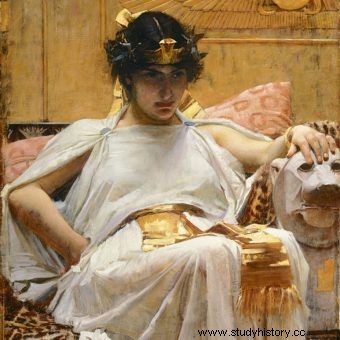
Cleopatra by John William Waterhouse
Cleopatra the Great, Cleopatra VII Philopator (69-30 BCE)
Egypt's last independent queen was from the Ptolemaic dynasty. She assumed power in AD 51 after the death of Ptolemy XII Auletes together with her brother Ptolemy XIII Philopathor. As a result of a conspiracy of court dignitaries in 49 AD she had to flee from Egypt to Palestine. At the time of the meeting of the army organized by her with the troops of her brother on the ship, Pompey, fleeing from Caesar, arrived and was murdered by the supporters of Ptolemy XIII. This drew the anger of Caesar upon the latter, who demanded that he be reconciled with his sister.
After Caesar and Cleopatra arrived in Alexandria, a revolt was stirred up against them, but they were brought under control thanks to reinforcements from Syria and Palestine. Ptolemy XIII died in AD 47. Julius Caesar decided that Cleopatra would rule Egypt together with another younger brother, Ptolemy XIV. It was during this period that Cleopatra's famous romance with Caesar began. In mid-47, she gave birth to his son, Ptolemy Caesar, known as Caesarion. In 46 she went to Rome where she spent 2 years.
When she returned to Egypt after Caesar's death, she ordered the murder of Ptolemy XIV and began to rule on behalf of her son herself. After the battle of Philippi, victorious for Mark Antony (AD 42), she met him in Tarsus. This gave birth to their romance, and Cleopatra gave birth to two of his children. New territories joined Egypt, incl. Cyprus and part of Crete, and the state itself grew stronger during this time. On September 2, 31, Antony was defeated at the Battle of Actium, and Octavian's troops entered Egypt in AD 30. Seeing no chance of staying in power, Cleopatra committed suicide on August 12, 30, possibly drinking poison.
